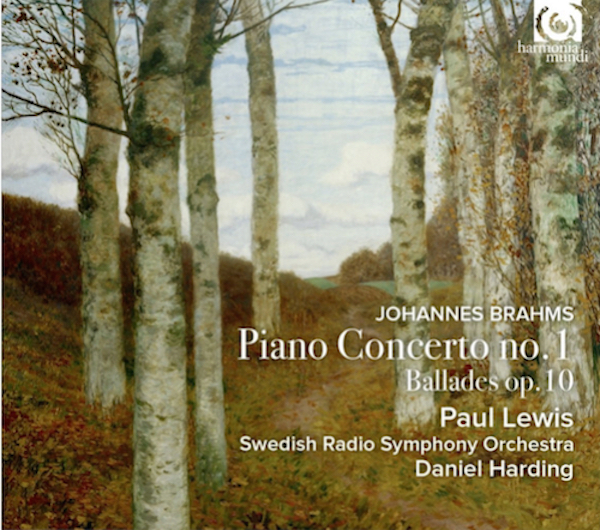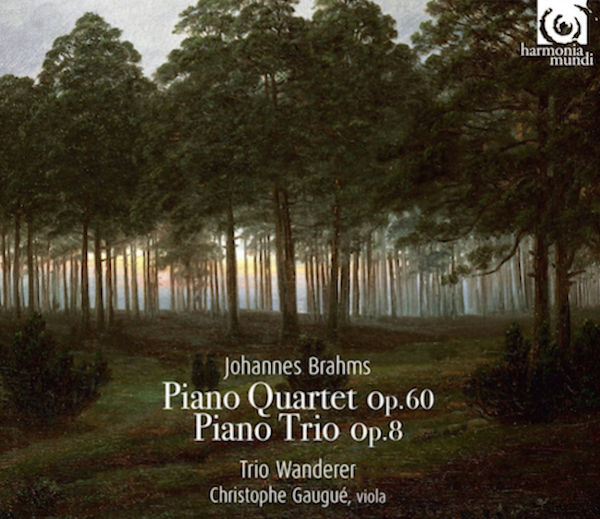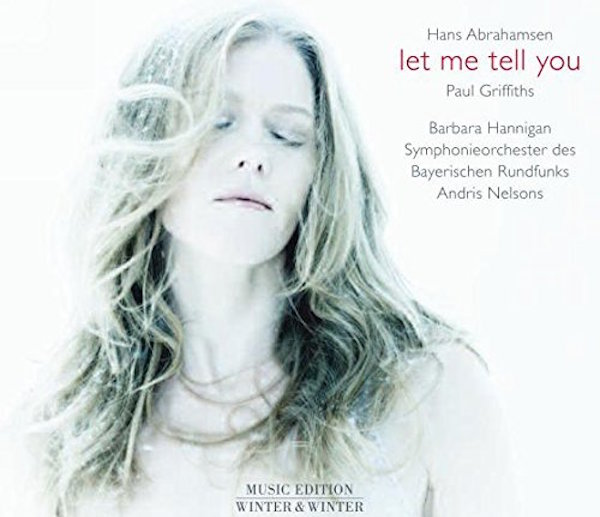Classical Music CD Reviews: Paul Lewis and Trio Wanderer play Brahms, and Hans Abrahamsen’s “let me tell you”
Three superb albums: two focusing on works by Brahms, one featuring Hans Abrahamsen’s thirty-minute-long meditation on Shakespeare’s Ophelia for soprano and orchestra.

By Jonathan Blumhofer
If you appreciate your Brahms sounding like the musical equivalent of a Manhattan – dark, strong, no-nonsense – you’ll find much to appreciate in Paul Lewis’s new recording (from Harmonia mundi) of the D-minor Piano Concerto. From the opening of the first movement, this is a furious, focused, brilliantly executed document.
But not to worry: if your ideal Brahms is smoother and more relaxed, there’s plenty of that here, too. Listen to the way Lewis caresses his first unaccompanied solo in that opening movement – or pretty much the whole of the second, for that matter – to hear some of the most exquisite, evocative piano playing imaginable: rich, warm, and delicate.
In fact, Lewis has pulled off quite the balancing act in this performance: you get both opposing sides of Brahms’s musical personality – the abstract Classicist and the heart-on-sleeve Romantic – in lively conversation with one another, provoking action and sparking some real fireworks. Rarely, for instance, does Brahms’s debt in this Concerto to Chopin and Schumann come across so clearly. But, in Lewis’s hands, you also hear how his rich, chromatic style influenced later Romantics, like Rachmaninoff. There’s a marvelous blend of intensity and inwardness to his playing, one that really fits this piece but that, for any number of reasons, you don’t always encounter together in the same performance.
Also notable are the ways in which Lewis brings out the many episodes of stern counterpoint that dot the score. These sections can prove stumbling blocks for Brahms interpreters, but Lewis makes them really sing (in the first movement) and mines their playful side (in the finale) so that they’re anything but dour. This isn’t the quickest of Brahms First Concertos – the opening movement clocks in at a healthy twenty-three-plus minutes and the last pushes thirteen – but its momentum never loses focus or energy.
In this endeavor, Lewis is handsomely aided in the accompaniment Daniel Harding and the Swedish Radio Symphony Orchestra (SRSO) provide. From the hurtling power of the opening motive right through to vigorous last bars of the finale, soloist and orchestra are completely in synch.
To fill out the album, Lewis delivers a strongly lyrical reading of the op. 10 Ballades, an interesting pairing given its near chronological proximity to the op. 15 Concerto. It’s a less dramatic set of movements, overall, but Lewis explores their quiet concentration in a reading that’s focused, tense, and haunting.

One of the most consistently satisfying chamber groups on the scene today is the Paris-based Trio Wanderer. A few years ago, I found their rhapsodic performance of Anton Arensky’s Piano Trio no. 1 hard to put down; now they’re back with an all-Brahms disc (from Harmonia mundi) made up of the original version of the Piano Trio no. 1 and the Piano Quartet no. 3 (in which they’re joined by violist Christophe Gaugué).
To cut to the chase, both performances are terrific. Textures are clear, balances ideal. Pianist Vincent Coq mines his keyboard’s tonal palate well – its lowest registers really speak with a rich, full sonority while the higher ones offer a roundly lyrical tone – but there’s an ease and confidence in the whole ensemble’s playing in each of these pieces that’s most engaging.
That last is especially true of their reading of the great C-minor Piano Quartet, filled as it is with complicated rhythmic profiles and long-flowing melodies. If the first movement comes across as the tautest and most uncompromising of the four, the second one (a scherzo) dances with glee. In the third, cellist Raphaël Pidoux opens with a ravishing account of his substantial solo and the rest of the group picks up right where he leaves off. The finale packs its own special brand of ambiguous wit.
Brahms’ 1889 revision of the B-major Piano Trio cut away quite a bit of musical fat, though the Wanderers do what they can to turn in a warmly dramatic account of the 1854 original here. The first movement is appropriately heroic and monumental; the second, filled with pep; the third, supremely devotional; and the finale marked by plenty of emotional turbulence.

When Hans Abrahamsen won the 2016 Grawemeyer Award for let me tell you, a thirty-minute-long meditation on Shakespeare’s Ophelia for soprano and orchestra, it marked the fifth or sixth time that prize had been given out to a score that had received a strong measure of both critical and popular success since the turn of the last century. Winter & Winter’s premiere recording of the work, featuring Barbara Hannigan and the Bavarian Radio Symphony Orchestra (BRSO) conducted by Andris Nelsons, fully demonstrates why all the praise is warranted.
Commissioned by Hannigan and set to a text by Paul Griffiths, let me tell you chronicles the psychological and emotional collapse of Ophelia, using just the 480-or-so words allotted the character in Hamlet. As such, the lyrics are direct and packed with meaning. So is Abrahamsen’s score, which features numerous sections that are essentially diatonic (it ends, more or less, in E minor) but many others that are clouded by dense textures and natural harmonics.
There are many brilliantly evocative moments. At the climax of the fifth of its seven movements, the line “You have sun-blasted me/and turned me to light” is marked by a series of falling figures starting in the orchestra’s highest register, becoming denser as they descend, and finally fracturing and spreading out as the gesture reaches the bottom of the orchestra’s range: the pure light has now been broken by shadows. Similarly, Abrahamsen conjures a shattering mood of disorientation in the third movement (“There was a time, I remember, when we had no music”) with plunking double bass pizzicati, sighing winds, and a kind of vocal “Bebung effect” that’s simply unforgettable. The same might be said for the finale, with its haunting snowscape crafted out of rhythmically complex canons, “mistuned” harmonic partials, and inventive sounds (like a spoon run up and down the celesta keyboard).
The present recording captures the music’s drama and much more. Hannigan sings her part with lustrous tone, supreme technical command (equally notable in the driving, Ligetian flourishes in the fifth song, “Now I do not mind,” as it is in the delicate precision of her stratospheric entries in the finale, “I will go out now”), and remarkably intelligible diction. Like I said of her even more intense performance of this piece in Boston in February, she’s an artist in her prime with an instrument that’s simply a marvel to hear in action; and this score is tailor-made for her.
For his part, Nelsons draws playing of great pliancy, energy, and color from the BRSO. They – with Hannigan – capture the music’s harrowing mystery, tragic aura, and sumptuous beauty in equal measure.
But the real hero here is Abrahamsen, who’s crafted a piece that’s rigorously intelligent, offers ample emotional rewards, and is easily graspable on first listening. And it’s not a shallow stream, either: let me tell you has many more secrets to reveal on subsequent hearings. Indeed, Abrahamsen seems to have written that rarest of works, one that’s great and masterful, and (so far, at least) recognized as such from the start. This is a recording that does him and let me tell you proud.
Jonathan Blumhofer is a composer and violist who has been active in the greater Boston area since 2004. His music has received numerous awards and been performed by various ensembles, including the American Composers Orchestra, Kiev Philharmonic, Camerata Chicago, Xanthos Ensemble, and Juventas New Music Group. Since receiving his doctorate from Boston University in 2010, Jon has taught at Clark University, Worcester Polytechnic Institute, and online for the University of Phoenix, in addition to writing music criticism for the Worcester Telegram & Gazette
Tagged: Andris Nelsons, Brahms, Hans Abrahamsen, Harmonia Mundi, Paul Lewis, Trio Wanderer, let me tell you
